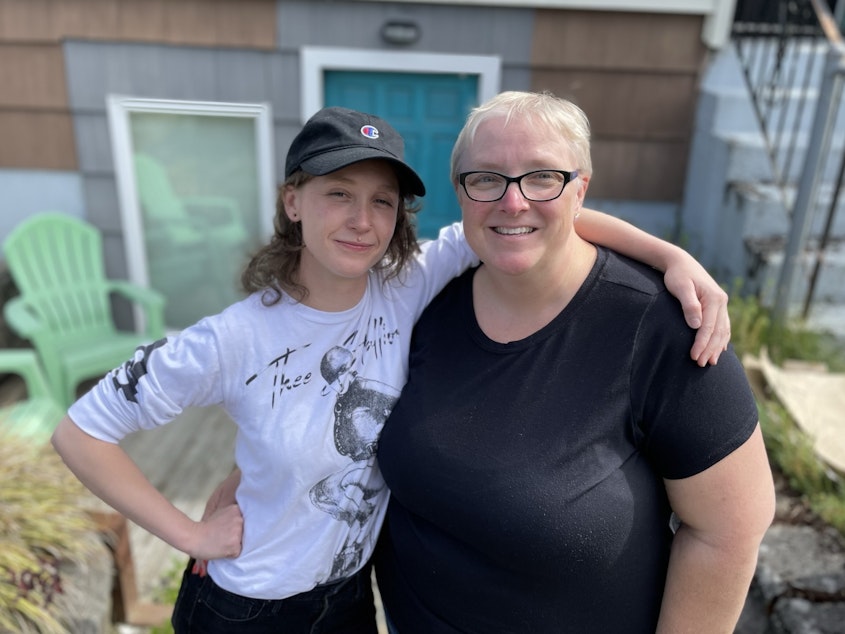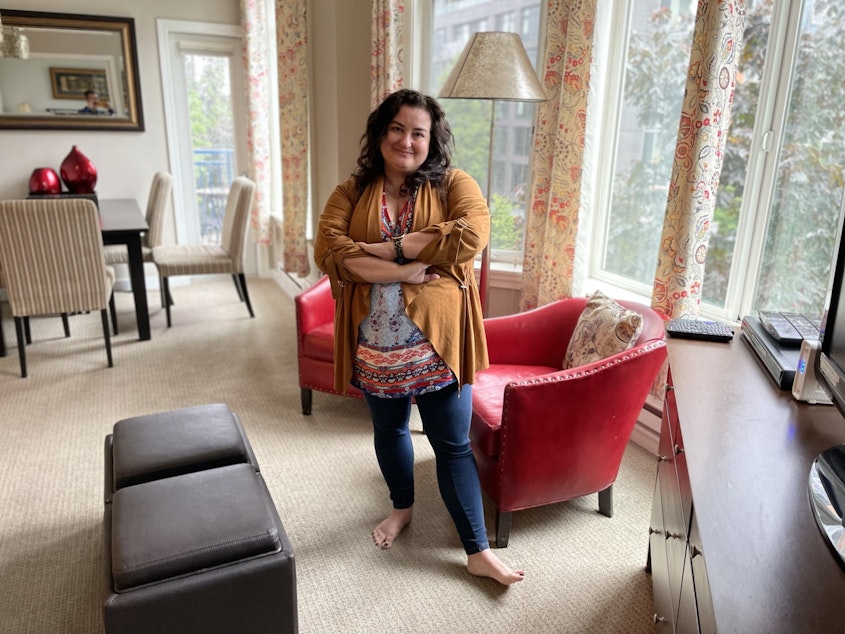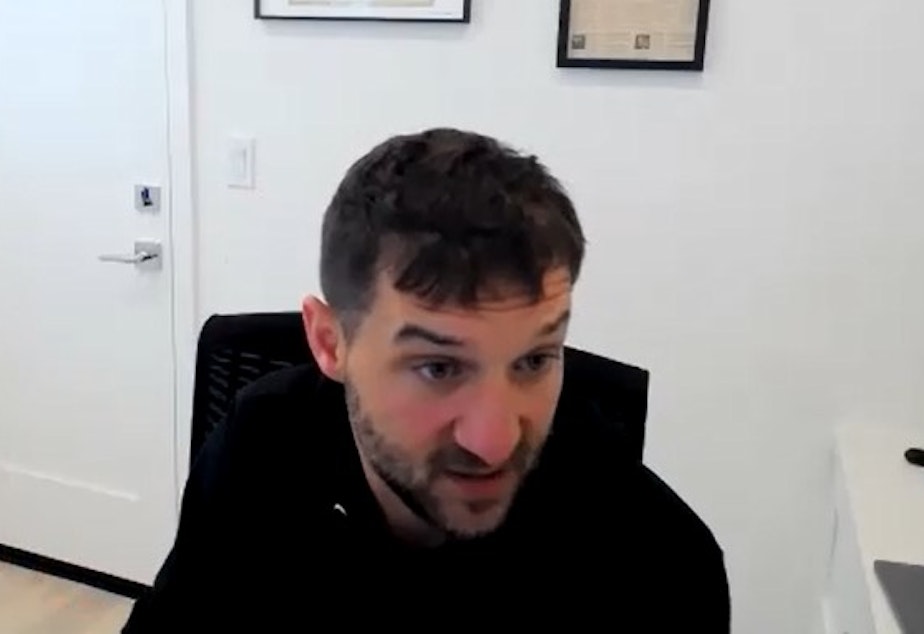The pros and cons of Airbnbs in Seattle

In Seattle, where Airbnbs are highly regulated, it's a form of shopping local. On the other hand, Airbnbs drive up the cost of housing a bit.
I’m in South Seattle, a few blocks from the Othello light rail station. It's a diverse part of the city, full of older single family homes.
On Airbnb’s website you can see there’s a cluster of overnight rentals here. It doesn’t give you precise locations, so I walked around looking for one.
I spot two women and a teenager carrying luggage from their car into a basement apartment.
Bingo.
“I’m just showing them around the Pacific Northwest, they came out to visit," says Victoria Baker. "This is their first time out here, so we went to the coast, and now we’re in Seattle — just showing them the sights.”
Sponsored
Baker is from Portland, and she’s showing around her sister and her niece from Kentucky. She really likes this neighborhood.
“This is like, where people live. Not in a strip mall, where a hotel is. So, yeah, I don’t know — getting kind of a real experience, quote unquote. Airquotes.”
I tell them I’m looking into how Airbnbs affect neighborhoods.
Sheresa Dekker, Baker's the sister, says she believes staying in Airbnbs is good. She thinks of them as small businesses.
“I love to be able to support small businesses in my neighborhoods because in the end, it makes a neighborhood thrive.”
Sponsored
In Seattle, most Airbnb owners are small businesses. Due to tight regulations, it’s only legal to own two short-term rentals in Seattle.
Baker is more skeptical. And some residents here are, too.
Jennifer Trygstad lives in the Othello neighborhood. One time, she says, she was walking her dog when she saw a couple of older white women who were visibly upset.
“I asked them what was happening," Trygstad said. "And they said they hadn’t known that their Airbnb was in a neighborhood like this.”
The Airbnb guests had just seen what they thought was a drug deal in a driveway across the street.
Sponsored
“They were very worried and wanted to not have to stay here in the Airbnb.”
After they left in a taxi, Trygstad says she circled back. She was worried about her neighbors.
"I went up and talked to them, and they were two Latino men, and I said, 'Just so you know, those women who had been standing here said they thought you were dealing drugs. So I just want to make sure, you know, to be prepared in case the police come or something.' And they were obviously completely shocked, because they were just standing in front of their house."
That’s one way that Airbnbs can change neighborhoods: By bringing in people who may not understand the place or its residents.
But those visitors bring money, too. And that can have economic impacts.
Sponsored
D
avide Proserpio studies the economic impacts of Airbnbs. He works at the University of Southern California.
“It’s complicated," he said. "Airbnb's doing many things. And some can be considered as good, and some can be considered as negative.”
Here’s a negative effect: Consider that basement apartment in Othello, where we met the sister tourists. If it weren’t an Airbnb, it could be a long term rental, an apartment.
Airbnbs pull housing out of the neighborhood supply. And that drives up housing costs for people who want to live in a neighborhood.
Sponsored
“How significant were these increases?” I asked.
“If you look at the estimates, they seem pretty small," Proserpio said. "But we did a back of the envelope calculation," to answer the question, "Given the year over year increase in rents and house prices, how much is Airbnb contributing to these?"
Proserpio and the other researchers on his team found that in cities where Airbnb operates, it’s responsible for about 20% of the increase in the cost to buy a home. Airbnb’s responsible for 14% of the increase in rents.
“They’re not extremely large numbers, but they’re contributing to what is already a problem in the United States.”
Rising costs can drive residents out of a neighborhood.
Ron Momoda lives in Othello in a house his parents bought in the 1960s. It’s a lot to keep up, with many rooms and a beautiful yard.
As property taxes rise, he’s wondering if he can stay.
“I need to reevaluate that," he said. "But I would really like to stay here as long as possible. But right now, it’s getting unaffordable to buy homes — but it’s also become unaffordable just to live in the home.”
Momoda has been watching YouTube videos about “Van Life.” He’s wondering if he should live out of a van for a while.
But in a way you might not expect, Airbnbs can also help people in situations like Momoda's.
Davide Proserpio’s research shows that when Airbnbs come into a neighborhood, a lot of people develop their properties in ways that can actually help them stay.
It takes money to do it. But homeowners are more likely to turn an unused basement into a mother in law apartment if they can earn money off it.
'House hacking'
Kaela Valdes calls this “House hacking.” She’s a realtor who also owns and manages Airbnbs.
“House hacking is awesome for people of all different walks of life," she said. "Somebody starting out — their very first home — I always try to get them to house hack.”
Renting out a portion of the property you’re living on to overnight guests can help cover the cost of a home, especially if you’re willing to clean up after the guests yourself.

It works best, Valdes said, on properties with a little extra space you can rent out. You know, like a duplex, or a basement apartment.
“Those are the best types of properties. This is why. You’re gonna be gaining income — probably enough income to almost make your mortgage payments — and also house you. So it’s 2 for 1.”
House hacking is not buying a property and renting the whole thing out on Airbnb. Valdes said people who think they can buy a whole house at today's prices and use Airbnb income to immediately pay the whole mortgage are mistaken. It takes years of holding a property before inflation pushes rents high enough to cover operating costs, she said, holding a printout featuring sobering economic figures.
This economic advantage for people who've held their properties a long time could lead to another negative effect: People who would otherwise sell their homes to new families are holding on to them for short-term rentals.
On the other hand, in some cases, this can be a form of house hacking where a family uses a home when they need it. For example, a family might buy a condo while a student is going to college, then rent it out on Airbnb for a number of years, until the parents downsize from a larger home and move into that condo to be closer to Seattle's cultural activities during retirement.
Living in a condo part time and renting it out the rest of the year is another form of house hacking Valdes recommends to clients. For example, a student may need an apartment only during the school year. It can be rented out on Airbnb during the summer, when short-term rentals are in peak demand.
Another positive effect: More housing
The backyard cottages and mother-in-law apartments that get built as part of a house hacking strategy can sometimes turn into permanent housing.
During the pandemic, for example, the number of Airbnb listings in the city of Seattle dropped by about 44%, according to data from AirDNA, which tracks Airbnb data. From the low point in winter of 2020, only a modest number of listings have returned to the platform.
What happened to all those Airbnb listings?
It's likely some of them became long term rentals: Housing for people staying in town for months while they get settled, or doing fill-in work at a local company.
Because Airbnbs encourage the production of so-called "missing middle" housing, researcher Davide Proserpio said some of the negative impacts of Airbnbs over time become positive impacts.
RELATED: Housing Density: What we're missing without a middle option
A few conclusions
Okay, so what did we learn from all this?
Airbnbs can bring new people to a neighborhood. Sometimes they’re better guests than others. And Airbnbs do seem to raise the cost of housing some.
But the platform also gives people, who can afford it and are willing to “house hack,” a way to hold on to their homes, by using tourists’ money to help pay for a place to live.
And over time, this pattern adds much-needed housing stock to the overall supply.





